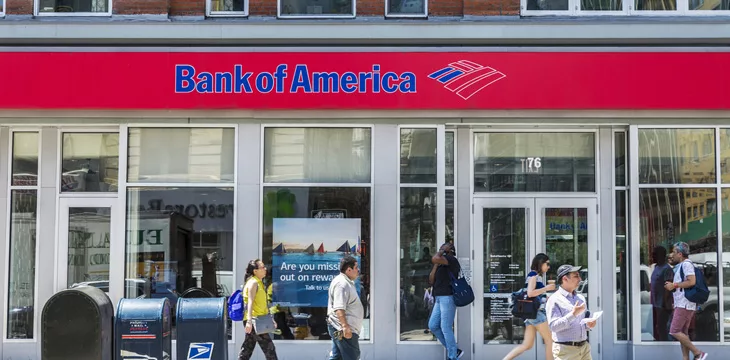|
Getting your Trinity Audio player ready...
|
The Bank of America (BoA) says integrating artificial intelligence (AI) with existing banking processes is expected to offer a range of positives for the financial services industry.
BoA highlighted automation as the most apparent application of machine learning (ML) tools in finance, adding that productivity and efficiency will be added benefits, according to reports. However, the bank’s analysts led by Richard Thomas warn that despite the upsides of AI use, entities in the space will have to proceed cautiously.
“Whilst greater automation—likely to be the first and greatest application of AI technology for banks—has the potential to improve bank productivity and thereby enhance bank returns, we also see some vulnerabilities around broad use of AI in banks,” read the report.
BoA stated in its report that banks and other financial institutions must proceed cautiously in their quest to adopt AI. The report drew attention to privacy and cybersecurity risks associated with integration with AI tools, warning that customers’ information may be within reach of bad actors.
The bank cites the democratization of AI and the “lower barriers to threat actors” as significant areas of concern for banks to grapple with in their attempts to integrate AI.
Aware of the threat of AI to finance, several U.S.-based banks have barred employees from using generative AI tools in the workplace over concerns of potential data leaks.
Many banks are already incorporating AI into their offerings to spot financial anomalies, assess credit risks, and predict customer behavior. Several financial institutions have
adopted Google’s (NASDAQ: GOOGL) AI-powered anti-money laundering (AML) tool, while others rely on Mastercard’s (NASDAQ: MA) offering to crack down on financial crime.
Despite the initial forays in adoption, BoA analysts say the prospect of significant revenue growth from AI is “less tangible” but in a decade, the financial windfall could contribute significantly to banks’ earnings.
While banks are urged to proceed cautiously with AI, BoA’s report calls on regulators to ensure proper guardrails will protect the financial industry from existential AI risks.
Southeast Asia grabs the bull by the horns
While U.S.-based banks dither on embracing AI, banking regulators in Southeast Asia are urging commercial banks in the region to adopt the technology for improved service delivery. The Reserve Bank of India (RBI) made a call via its Deputy Governor Mahesh Kumar Jain for local lenders to leverage AI to reduce systemic banking risks.
Meanwhile, the Monetary Authority of Singapore (MAS) calls for a measured approach to AI adoption after being scarred by its botched digital currency foray.
“We want to play a long game in this space,” said one MAS executive on AI. “We want to ensure whatever AI we adopt or we promote, it stays for a long period of time. We have learned a lot of lessons in the whole DLT/digital currency space. If you rush yourself very fast, you may see bad actors coming very quickly.”
In order for artificial intelligence (AI) to work right within the law and thrive in the face of growing challenges, it needs to integrate an enterprise blockchain system that ensures data input quality and ownership—allowing it to keep data safe while also guaranteeing the immutability of data. Check out CoinGeek’s coverage on this emerging tech to learn more why Enterprise blockchain will be the backbone of AI.
Watch: Blockchain can bring accountability to AI

 08-02-2025
08-02-2025 





